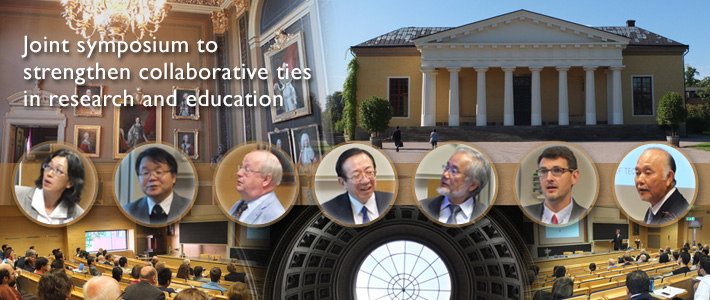
Tokyo Tech aims to become one of the world's top 10 research universities by 2030. In pursuit of this goal, the Institute continues to cultivate global leaders in the field of science and technology as it promotes advancements in innovation. As an important component of this, Tokyo Tech co-hosted a joint symposium with Uppsala University (UU) on September 16 and 17, 2014 in Sweden. The symposium strengthened collaborative ties in research and education between the two universities.
Uppsala University and Ångström Laboratory
 Interior of the University Main Building of
Interior of the University Main Building of
Uppsala University
Founded in 1477, UU is the oldest university in Scandinavia. It is also one of the most prominent universities in Europe and among the top 100 in world university rankings. The site of the symposium was the world-renowned Ångström Laboratory, named for celebrated 19th century physicist Anders Ångström. Anders Ångström held the chair in physics at UU and the Angstrom unit (1 Å=10-10m) is named in his honor. Nobel Prize winners Manne Siegbahn and his son, Kai, were also professors at the laboratory. They were awarded Nobel Prizes in physics in recognition of their developments of X-ray spectroscopy and electron spectroscopy, respectively. In addition to the department of physics, Ångström Laboratory is home to the departments of mathematics, chemistry and engineering.
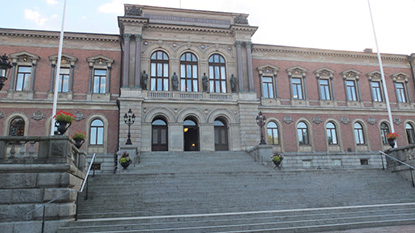 University Main Building
University Main Building
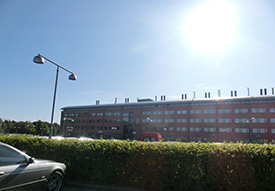 Ångström Laboratory
Ångström Laboratory
Joint Symposium
Tokyo Tech Professor Masako Ikegami of the Graduate School of Decision Science and Technology was the key person behind the relationship that developed between UU and Tokyo Tech. Professor Ikegami earned her doctorate from UU and lectured at Sweden's Stockholm University. Her relationship with UU led to an initiative that brought the symposium to fruition. A long-time acquaintance of Ikegami, UU Professor Gunnar Ingelman, also contributed greatly to this effort. Professor Ingelman is a former UU Dean of Physics and current Chairman of class for physics of the Royal Swedish Academy of Sciences. The Uppsala University-Tokyo Tech Joint Symposium brought together renowned researchers from both universities for presentations in five different fields.
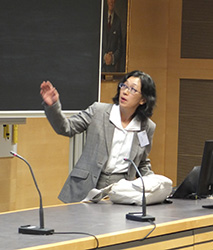 Professor Masako Ikegami
Professor Masako Ikegami
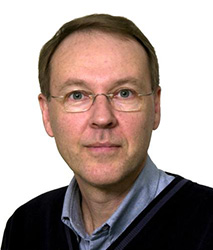 Professor Gunnar Ingelman
Professor Gunnar Ingelman
Uppsala University-Tokyo Tech Joint Symposium
This joint symposium featured presentations by UU and Tokyo Tech researchers in the fields of Electronics & Materials Science, Physics and Nuclear Science & Technology, Lifescience & Biotechnology, Renewable Energy, and Academic-Industrial Collaboration and External Funding for Collaborative Research.
Electronics & Materials Science
The Electronics & Materials Science section led off with a presentation by Professor Hideo Hosono of Tokyo Tech's Frontier Research Center on the development of iron-based superconductors and electrides that are stable at room temperature. Also presenting were Tokyo Tech Professor Ryoji Kanno (Department of Electronic Chemistry, Interdisciplinary Graduate School of Science and Engineering), Professor Takehiko Mori (Department of Organic and Polymeric Materials, Graduate School of Science and Engineering), and Professor Shuichi Murakami (Department of Physics [Condensed Matter Physics], Graduate School of Science and Engineering). From UU, Senior Professor Claes-Göran Granqvist, long-time friend of Professor Hosono, spoke about research conducted with Professor Lars Österlund on emerging materials and devices for benign indoor light and air environments. Following this were five other presentations given by Docent Biplab Sanyal, Professor Shili Zhang, Professor Kristina Edström, and Dr. Fridrik Magnus.
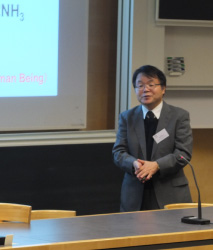 Professor Hideo Hosono
Professor Hideo Hosono
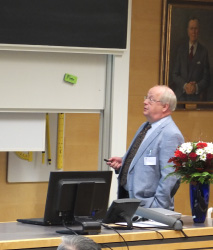 Senior Professor Claes-Göran Granqvist
Senior Professor Claes-Göran Granqvist
Physics and Nuclear Science & Technology
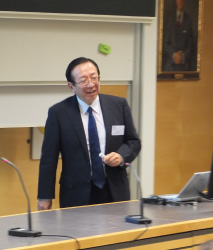 Professor Kenji Takeshita
Professor Kenji Takeshita
In the Physics and Nuclear Science & Technology section, Professor Kenji Takeshita of Tokyo Tech's Research Laboratory for Nuclear Reactors spoke about the most recent research on nuclear waste disposal and the possibility of detoxifying nuclear waste through the separation and processing of radionuclides.
From UU, Professor Göran Eriksson gave a presentation on diagnostic techniques for nuclear fusion neutron sources. Following this, Professor Jan Källne spoke about power generation technology through the hybridization of nuclear fusion and fission. Discussion among participants from UU and Tokyo Tech was animated and showed excitement about the development of new nuclear technology. The two universities hope that continuing collaboration will open new doors in this area of research.
Lifescience & Biotechnology
Researchers at UU are working to create analytical tools for lifescience studies. UU researchers include Nobel Prize winners Professor The (Theodor) Svedberg, who developed the ultracentrifuge, and Dr. Arne Wilhelm Kaurin Tiselius, who focuses on electrophoresis.
The symposium kicked off with a presentation on autophagy by Honorary Professor Yoshinori Ohsumi (Frontier Research Center, Tokyo Tech). Professor Ohsumi was followed by Professor Johan Elf (UU), who introduced a method to analyze the intracellular molecular dynamics of proteins, and Professor Hideki Taguchi (Department of Biomolecular Engineering, Graduate School of Bioscience and Biotechnology, Tokyo Tech), who gave a presentation on protein folding entitled "Ideal and Reality of the Protein World."
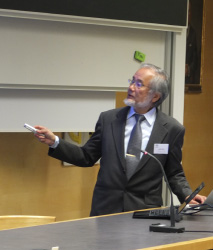 Honorary Professor Yoshinori Ohsumi
Honorary Professor Yoshinori Ohsumi
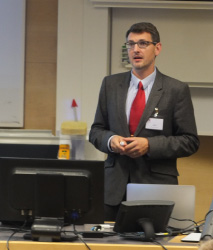 Professor Johan Elf
Professor Johan Elf
Renewable Energy
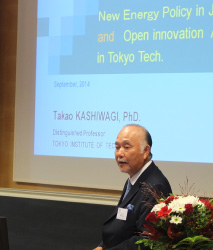 Institute Professor Takao Kashiwagi
Institute Professor Takao Kashiwagi
Institute Professor Takao Kashiwagi (Solutions Research Laboratory, Tokyo Tech) explained the Japanese government's Basic Energy Plan, with a particular focus on the government's desire to promote power dispersion through the introduction of hydrogen and electricity system reforms. UU presentations included an introduction to highly-efficient solar cells applying thin-film technology and the role of nano-materials in energy accumulation.
The Swedish government's enhancement of renewable energy development and the excellent renewable energy technology developed by Japan can be applied in a complementary manner. Recognizing great interest among researchers and students in Sweden's approach to renewable energy, and the high potential for joint international research in this area, Tokyo Tech presented a proposal for collaborative work in marine energy development, a program being promoted by UU.
Academic-Industrial Collaboration and External Funding for Collaborative Research
UU introduced its AIMday program. AIMday is a unique program that promotes joint research by providing opportunities for researchers and companies to connect and exchange information to better understand industry needs. UU also explained Horizon 2020, EU financial assistance in science and technology made available for advanced joint research.
Outcomes of the Joint Symposium
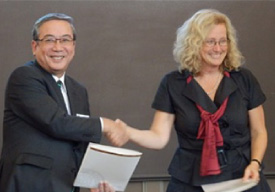 Tokyo Tech then-President Yoshinao Mishima and Professor Eva Åkesson, Vice-Chancellor of Uppsala University
Tokyo Tech then-President Yoshinao Mishima and Professor Eva Åkesson, Vice-Chancellor of Uppsala University
During the symposium, the two universities signed a Letter of Intent for the promotion of interaction. Professor Hideo Hosono, Senior Professor Claes-Göran Granqvist, Professor Masako Ikegami, and Dr. Mikael Höök (Senior Lecturer in the Department of Earth Sciences, UU) signed a memorandum of understanding for joint research.
In response to this tie-up, Tokyo Tech and UU have been working toward the realization of joint research. In the field of materials science, both universities are seeking joint research in computational science and materials. Senior Lecturer Mikael Höök from UU visited Tokyo Tech in November 2014 and held a seminar on environmental policy.
The two universities are planning to hold the second symposium in 2015 at Tokyo Tech as a follow-up to the first symposium.
Tokyo Tech will continue to strengthen its relationship with Uppsala University and promote various interactions among researchers, through which the Institute expects to accelerate joint international research and enhance Tokyo Tech's research capabilities.
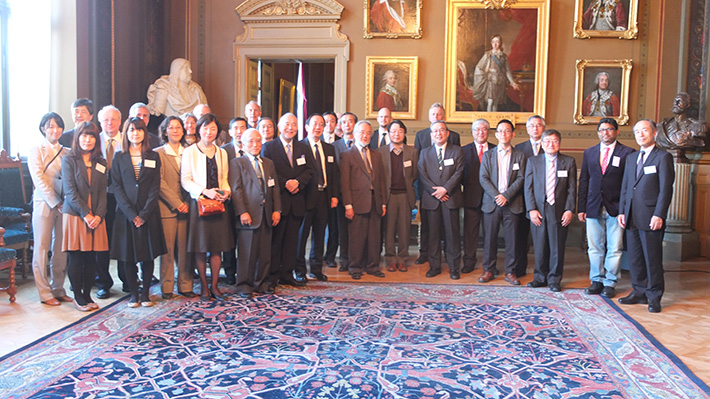
The Special Topics component of the Tokyo Tech Website shines a spotlight on recent developments in research and education, achievements of its community members, and special events and news from the Institute.
Past features can be viewed in the Special Topics Gallery.
. Any information published on this site will be valid in relation to Science Tokyo.

















